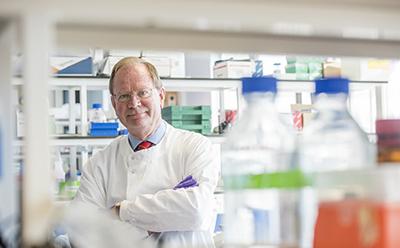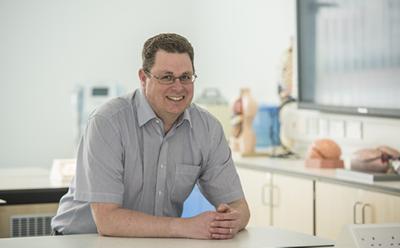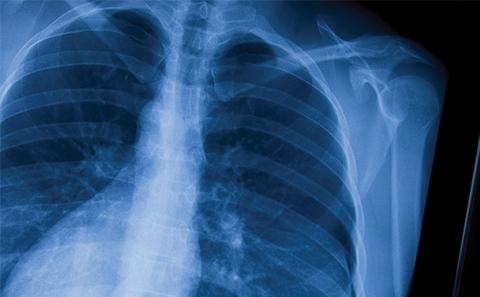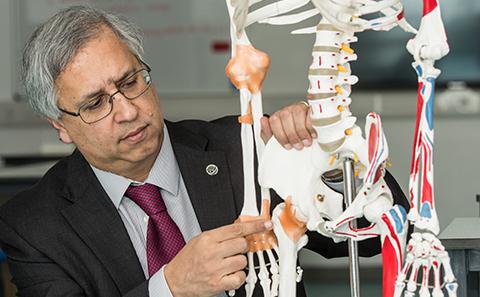Health impact of air pollution
Influencing government policy on air pollution.
Air pollution causes around 40,000 deaths and costs the UK economy £20bn every year, according to an influential report involving Southampton researchers.
Air pollution damages health
We are all exposed to air pollution to some extent, mainly from nitrogen dioxide emissions and particles from vehicle exhaust fumes, as well as domestic burning of coal and wood. The range and extent of problems this pollution causes to our health is much wider than previously thought, according to the influential 2016 report, Every breath we take: the lifelong impact of air pollution, commissioned by the Royal College of Physicians and Royal College of Paediatrics and Child Health.
Stephen Holgate, Medical Research Council Clinical Professor of Immunopharmacology at the University of Southampton, chaired the Royal College of Physicians and Royal College of Paediatrics and Child Health working party on air pollution that produced the report.
He says: “We now know that air pollution has a substantial impact on many chronic long-term conditions, increasing strokes and heart attacks in susceptible individuals. We know that air pollution adversely affects the development of the fetus, including lung development. And now there is compelling evidence that air pollution is associated with new-onset asthma in children and adults.”
When our patients are exposed to such a clear and avoidable cause of death, illness and disability, it is our duty to speak out.

The report highlights that although the government has set ‘acceptable’ limits for various pollutants in the air, all levels of pollution are damaging to our health and World Health Organization limits should be adopted. If indoor air pollution is added into the equation – where pollutants are given off from cleaning products, faulty boilers, paints, and so on – it’s estimated that a further 90,000 deaths in Europe are attributable to air pollution from indoor sources.
John Holloway, Professor of Allergy and Respiratory Genetics at Southampton, co-wrote a chapter of the report focusing on how infants and young children are affected by air pollution. This includes how early exposure to air pollution stunts the development of the lung while a baby is still in the womb and increases the chances of that lung, when the baby is born, becoming more sensitive to other environmental exposures, such as inhaled allergens that can lead to asthma.
“There are three major periods of vulnerability to the adverse effects of air pollution: the mother’s health during pregnancy, the development of the fetus and infancy,” says John. “Everything is inextricably linked. There is no doubt that air pollution can affect the fetus, either indirectly through the health of the mother, or directly by affecting developing fetal organs and systems. These effects can have a permanent influence on growth and health throughout life.”
Exposure of the young child to air pollution can produce definite harm and increase the risk of disease both immediately and throughout the rest of their lives. We must act now to ensure our future generations are not put at risk.
Pioneering research
Southampton researchers undertook some of the early pioneering work showing the damaging effects of air pollution on the lungs, particularly from diesel engines.
“Collaborating with colleagues across the UK and in Umeå in northern Sweden, in the 1990s, we demonstrated the effect of particulates in damaging the airway lining, and causing an increase in airway inflammation, the factor that aggravates respiratory diseases like asthma and chronic obstructive pulmonary disease,” says Stephen.
“We then became interested in trying to map out the precise mechanisms and we came up with a number of ideas about the way these pollutants created a stress response in the lungs. That stress response was the reason they developed the inflammation,” he adds.
In 1990, Stephen helped to set up the government’s advisory committee on air pollution: the Committee on the Medical Effects of Air Pollutants. In 2000, his team, including John, also identified the first asthma gene, ADAM33, which they reported in the journal Nature in 2001. This susceptibility gene has been shown to be linked to airway hyper-responsiveness and remodelling in chronic asthma.

John’s research has focused on the study of the genetics of allergy and asthma in order to understand why some individuals are more susceptible to developing these conditions than others. More recently, with Hasan Arshad, Professor of Allergy and Clinical Immunology at Southampton, and colleagues in the USA, he has been studying the epigenome, which is thought to control how the blueprint of DNA is expressed.
“DNA methylation is an epigenetic marker that can modify gene expression and can be added to DNA in response to environmental exposures. For example, we have shown that maternal smoking in pregnancy results in changes to the offspring’s DNA methylation patterns that persist until adulthood. Mechanisms such as this may explain how exposure to air pollution in early life can affect health throughout an individual’s life, even if there is no further exposure.”
The University has a long tradition of conducting the types of large longitudinal cohort studies that were vital for informing the Every breath we take report. One example is the Southampton Women’s Survey, carried out at the MRC Lifecourse Epidemiology Unit at the University between 1998 and 2001, in which 12,583 Southampton women were surveyed and continue to be monitored. Another is the Isle of Wight Birth Cohort study, which has followed 1,489 children born in 1989 on the island for the last 27 years, and is now also recruiting their children into a new cohort, the Isle of Wight Third Generation Study.
Recently Stephen and colleagues in the MRC Lifecourse Epidemiology Unit, led by Professor David Phillips, used government data on the use of coal and related solid fuels from 1951 to 1952 as an index of air pollution. They then demonstrated that the level of domestic (household) coal consumption in this period for each local government district of the UK was strongly associated with mortality in the same districts 40 to 60 years later. This suggests that air pollution, experienced over 60 years ago in early life, increases mortality from a wide variety of diseases. This has significant implications for the future health of the population, given the increasing levels of particulate exposure in UK cities today.
Influencing government policy
It is vital that we reduce pollution levels, explains Stephen:
Our message is that everyone needs to take some responsibility to reduce the levels of pollutant exposure. Our recommendation is that we work hard now to put pressure on the government to increase the legislation that gives us another clean air act like we had in 1956, but rather than focusing on burning coal, dealing with the current issue of pollutants from vehicles.
“Local authorities need to incorporate road planning in their building plans. Currently they don’t take traffic and pollution into account when building schools, for example. We should be encouraging active travel, to try and get people out of cars and onto their feet, and create a greater incentive in the UK to make that a safer option. We have some way to go, but we need to act now.”
Links to external websites
The University cannot accept responsibility for external websites.
Related Staff Member
Related Staff Member
You may also be interested in:

Getting under the skin of allergies
Our researchers are leading the largest study of its kind to improve our understanding of allergies

Tackling public health challenges
Instigating step changes in public health, both in the UK and internationally.

Volcanoes kick-start life
Volcanoes altered ocean chemistry, stimulating production of multicellular organisms.

